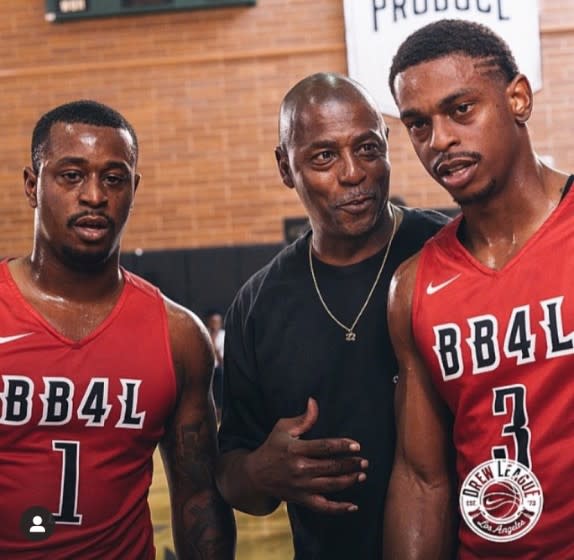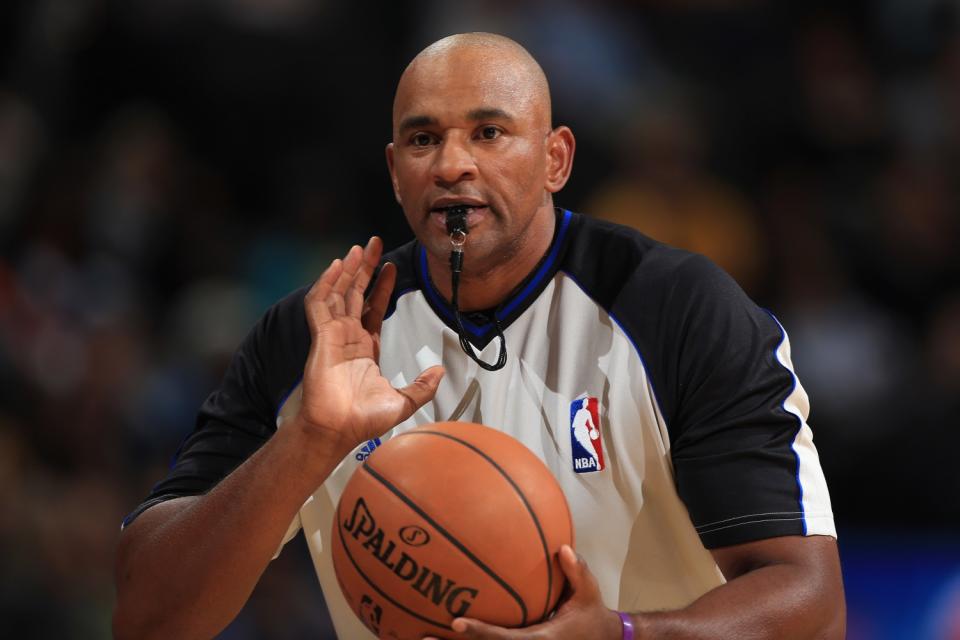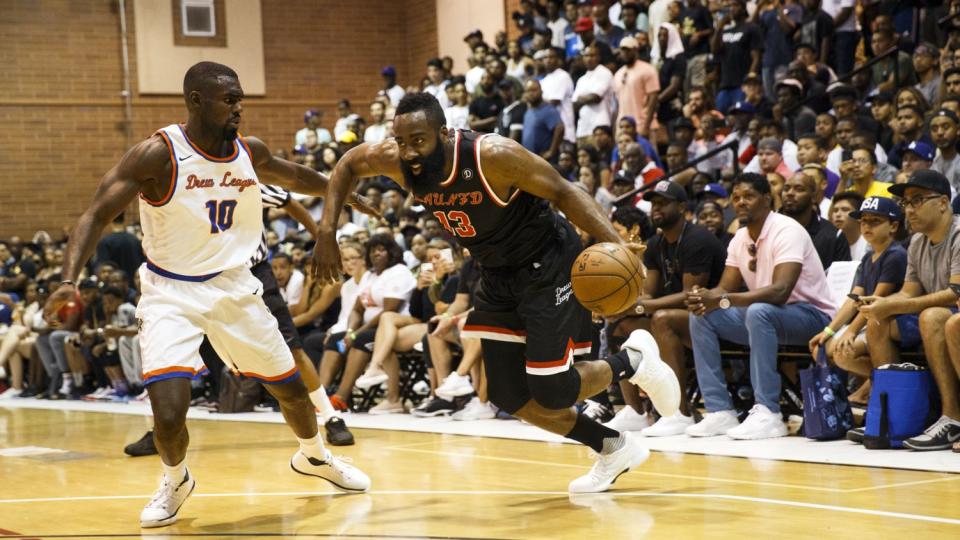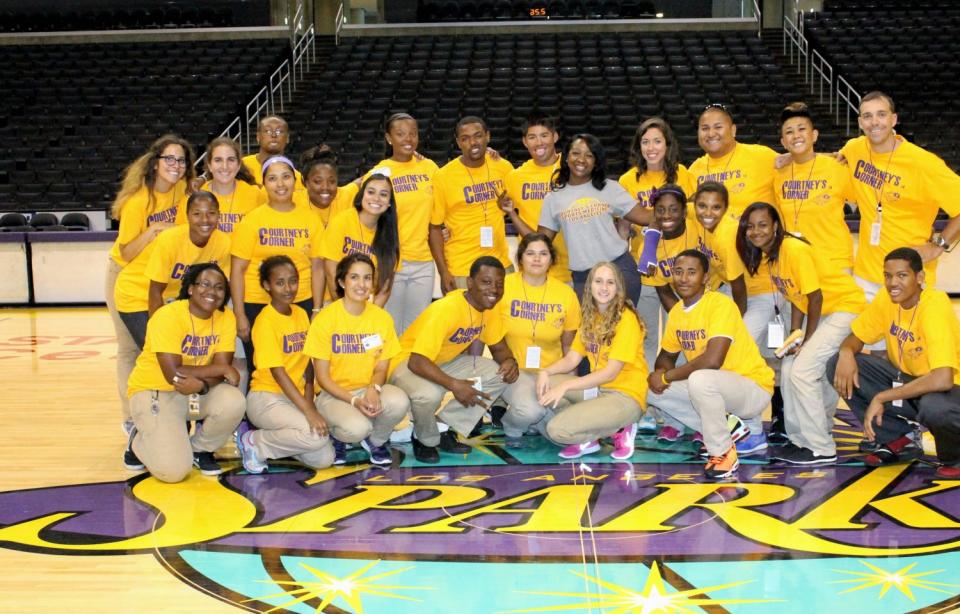Pandemic puts the Drew League family's summer in jeopardy

Every summer weekend of Casper Ware Jr.’s childhood was spent sitting on the baseline at Charles Drew Middle School.
It was there, along Compton Avenue, that Ware watched his father play in the Drew League so often he could predict the high-scoring guard’s moves. He saw NBA players drop by the pro-am tournament during their offseason. He imagined his own transition from spectator to player. He arrived on Saturday mornings. He was there until Sunday evenings.
When the league moved to Washington Park, Ware was on the court in 2011 when Kobe Bryant sank a game-winning, buzzer-beating jumper. In an even larger gym five years later, buoyed by the league’s surging popularity, it was Ware making the big shots — exploding for 27 points in the third quarter of the league’s championship game to beat a team featuring the NBA’s Nick Young and JaVale McGee.
If basketball was Ware’s first love, the Drew League became his second home. Ware, now 30, was practically raised by the Watts summer league, said Bill Crawford, who announced games there for 23 years, beginning with its founding in 1973.
“That’s what the Drew is," Ware said. "It's just family. I’m kind of closer to some of them people than my blood family.”
But for the first time in his life, Ware can no longer count on a summertime Drew League reunion.
Though Dino Smiley, the league’s longtime commissioner, remains optimistic that a 47th consecutive season can start on time on May 30, he acknowledged that the novel coronavirus and social-distancing guidelines put in place to slow its spread had led him to consider a once-unthinkable possibility. The Drew League — which has transformed, with financial backing from Nike, from a mom-and-pop operation into one with an international following, as well as an Instagram following of 418,000 — could be canceled for the summer if games cannot be played by June 14.
Other summertime basketball staples across the country also find themselves in limbo. With New York among the cities hardest hit by the coronavirus, the 70th season of Harlem’s Holcombe Rucker Summer League is in jeopardy.
“It’s tough for me to even think about a basketball tournament right now,” said Alan White, the Holcombe Rucker league's executive director.
Though the prospect of a summer without basketball pained officials, participants and workers in both leagues, their greater concern is the void that would be created should games stop. Drew's and Rucker’s longevity has turned these tournaments into cultural institutions, summertime staples in communities often fractured by violence and poverty.
Smiley sees success stories in figures such as Ware, whose experience prepared him for college stardom at Long Beach State and a professional career spent largely abroad, and Courtney Watson, the South L.A.-raised head athletic trainer for the WNBA Sparks.
“It’s bigger than just basketball because what happens is it brings families together,” said Smiley, who played in the Drew’s first season while in middle school and began coaching in it at 15. “Drew does a lot. It’s going to be a sad summer if we’re not operating.”
Kevin Cutler, a 10-year NBA referee, manages officiating for the Drew League. He sees the difference it makes.
“You can get people from different cliques, different gang sets, and it’s almost like a truce," he said. "It’s not about what territory, what turf, you’re from. It’s about we’re trying to find a place to get in here and find a good run.
“The Eastside of Los Angeles desperately needs it. We’ve had tons of leagues that have tried to copy it and just can’t. They don’t have the same flavor.”

Last year, 10 students from the league’s surrounding neighborhoods received scholarships worth $2,000 each from the league’s foundation. This year’s scholarship gala is scheduled for July 25, but Smiley concedes it’s now unlikely to take place. Scholarship checks could decrease to $1,000.
In Harlem, the Rucker’s summer youth league — a separate entity from the famed pro-am tournament played at nearby Rucker Park — serves nearly 1,500 kids, ages 7 to 18, each summer. They have access to Amateur Athletic Union teams and college preparatory programs run, in part, by college-age students hired for the summer.
White had hoped to add programs for financial literacy, as well as free cardiac and concussion screenings, but needed sponsorship dollars to do it. The economic crash that has followed the coronavirus pandemic has put such plans on hold.
“We can’t get out there and provide the way we want to provide because of this new invisible enemy,” he said.
The realization stung for White, who called himself living proof of using “basketball as a tool to open up different doors.” Raised by a single mother, with six brothers and a sister, he played in the same youth league before going to college. He worked in banking before returning to the nonprofit Holcombe Rucker Community League in 2002. A decade later, he became its director.
“Basketball,” White said, “saved my life.”
A canceled season wouldn’t create such an existential threat for the Drew League, which has received free uniforms and financial backing from Nike for seven years. The shoe deal is a reflection of its reputation as the epicenter of high-level summer basketball and a haven for NBA players such as James Harden and DeMar DeRozan, who have kept returning long after Bryant, LeBron James and Kevin Durant played during the 2011 NBA lockout.

“I’ve had NBA players talk to me during free throws,” Cutler said, “and say, ‘Am I going to see you at Drew this year?'"
Local fans, Crawford said, “can’t afford to pay $200 to see them at the Staples Center. We try to bring the NBA to them.”
Its hidden value, longtime participants say, is how it has become a training ground for far more than elite players looking to stay sharp.
Ware’s debut, while in high school, earned him a spot on an AAU team, and his performances in the subsequent 12 years have helped “build my brand,” he said. Others have secured overseas contracts. Cutler is among about 10 NBA officials who have worked the event. Alums include Violet Palmer, the first female NBA official, and Crystal Hogan, one of the few female officials to work at the NCAA level. Through free workshops, Cutler invites aspiring officials to watch and learn.
“If you can referee in that hostile environment, to be quite honest, 15,000 [fans] feels very different,” he said. “Because 15,000, they’re pushed away from you; 1,500, they’re on top of you [at Drew].”
Watson said her work helping the league’s injured players was critical to moving up from her job as Westchester High’s athletic trainer to the WNBA. It was Cutler, she said, who recommended her for the Sparks job. She has sought to pay it forward, running an athletic-training internship that since 2005 has created nearly 30 positions annually to young people entering the profession.

The Drew League has “given kids a platform to get off the street and really find something that they love and see others on the pro level from our community who can make it,” she said.
For now, those opportunities are on hold. The Drew League was expecting to move into its largest arena yet in May, at El Camino College. But guidelines banning large events in Los Angeles could stymie that. Smiley, who has run the league with his daughter for the last three years, is hoping to know more by mid-May.
“We haven’t said it’s not going to happen,” Smiley said. “We’re just working along expecting it to happen but preparing if it doesn’t.”
Since returning from Australia, where he played this season for the Sydney Kings, Ware has heard from friends who tell him they’re continuing to train under the assumption the Drew will play as usual.
He wants to believe that will be the case.
"A summer without the Drew League would be very strange for me,” Ware said. “Honestly, I can’t imagine.”
